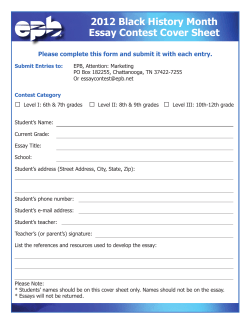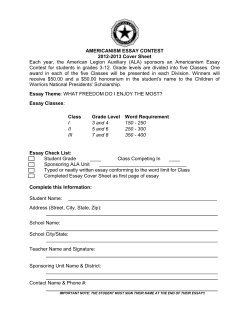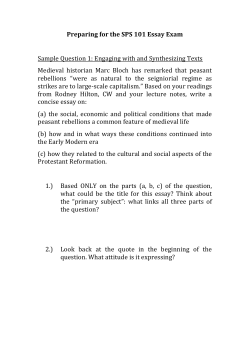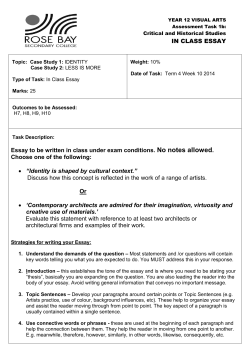
Proficiency Book.indb - Anglia Network Europe
CEFR C1 STEP TO AcCEPT Proficiency Student Book Revised & Updated Official preparation material for Anglia ESOL International Examinations John Ross Step To AcCEPT ProÀciency Student Book Developed and Published by: Anglia Education Group Ltd. Email: stepto@anglia.org Author: John Ross Printed in China, Hong Kong, Taiwan and the United Kingdom. Published, printed and distributed exclusively through Anglia Education Group Ltd. Publisher’s note: For the Àctional passages/sections any resemblance of names, characters, and incidents to actual persons, living or dead, business establishments, events or locales is coincidental. Copyright © 2015 Anglia Education Group Ltd. All rights reserved. No part of this work may be reproduced or used in any form or by any means – graphic, electronic, or mechanical, including photocopying, recording, taping, web distribution or information storage and retrieval systems – without the written permission of the publisher. The scanning, uploading, and distribution of this book via the internet or via any other means without the permission of the publisher is illegal and punishable by law. Please purchase only authorised editions and do not participate in or encourage electronic piracy of copyrightable materials. Your support of the author’s and publisher’s rights is appreciated. Second Edition ISBN 978-986-88938-5-6 Acknowledgments John Ross, Paul Derbyshire, David Clarkson, Gordon Beckman, Liz Bangs-Jones, Alice Osman, David Smith, Chen Kuo-shu, Gary O’Connor, Mei Susana Huang, Greg Tackett, Jessica Vokster Licences for photos and illustrations used in this book were obtained from bigstockphoto.com and wiki commons complying with permitted usage. Additional photographs by Chen Kuo-shu. CONTENTS 4 Introduction 10 Unit 1: Life is What You Make It 18 Unit 2: Higher Education 26 Unit 3: Money Talks 34 Unit 4: Logged In 42 Unit 5: The Squeaky Wheel 50 Unit 6: Itchy Feet Introduction to the Proficiency Exam (4), Improving Your English (5), British English vs. American English (6–7), Speaking Task One (8–9) Life Goals (10), Match and Discussion (Goals) (11), Listening – Section L3 (12–13), Grammar – Inversion (14), Test Practice Section W3 (14), Section R4 (15), Section W1 – Essay Writing (16–17), Transition Words (17) Vocabulary and Discussion (University Subjects) (18), Corrections (19), Sentence Structure (20), Section R5 (21), Commonly Confused Words (22), Writing Essays (23), Advantages and Disadvantages Essay (24), An Argument Essay (25) Vocabulary and Discussion (Multinational Companies) (26), Word Focus (27), Reading (28–29),Section R4 (30), Section R5 (31), Reading – Section R3 (32– 33) Vocabulary and Discussion (Electronic Gadgets) (34), Popular Websites (35), Word Focus (36), Essay Writing – Pros and Cons (37), Essay Writing – Banning Things (38–40), Listening – Section L3 (41) Vocabulary and Discussion (Urban Problems) (42), Writing Letters and Emails (43–46), Listening – Section L2 (46–47), Reported Speech (48), Section W3 (49) Vocabulary and Discussion (World’s Most Liveable Cities) (50), Speaking – Task Three (51), Listening – Section L1 (52), Discriptive Essay (53), Writing an Informal Letter (54), Noun Suffixes (55–56), Speaking – Task Two (57) 58 Unit 7: Under the Weather 66 Unit 8: A Touchy Subject 74 Unit 9: On Campus 82 Unit 10: Reach for the Stars 90 Unit 11: Brave New World 96 Unit 12: Fighting Fit 103 Anglia Sample Paper Vocabulary and Discussion (Extreme Weather and Natural Disasters) (58), Listening – Section L2 (59), Writing a Narrative Essay (60), Section R5 (61), Reading – Beringia (62–63), Writing a Summary (64), Test Practice Section R4 (64), Listening – Section L1 (65) Vocabulary and Discussion (Religions) (66), Describing Kinds of People (67), Speaking – Task Three (68–69), Reading Section R3 (70–71), Section W3 (72), Grammar – The Suffix -en (73) Vocabulary and Discussion (Universities) (74), Speaking – Task Two (75), Commonly Misspelled Words (76), Speaking – Task Three (77–78), Vocabulary (79), Listening – Section L2 (80–81) Vocabulary and Discussion (Space) (82), Writing an Informal Email (83), Essay Writing (83–84), Section R4 (85), Writing a Research Essay (86), Section W3 (87), Reading (88–89) Vocabulary and Discussion (Cities, Countries and Continents) (90), Listening & Reading (91), Reading (92–93), Writing a Summary (94–95), Section R4 (95) Vocabulary and Discussion (Health Problems) (96), Listening – Section L2 (97), Essay Writing (98–99), Listening, Reading & Speaking (100–101) Listening Paper (104–108), Reading & Writing Paper (109–120), Speaking Test (121–124) Unit 4 Writing Essay Task: Addiction to internet gambling has become a big problem. Internet gambling should be banned. 5 Discuss these statements with a partner. • • • • Gambling makes poor people even poorer. Taking risks is part of human nature. Alcohol causes more problems than gambling. It’s impossible to ban gambling. 6 Complete the essay with words from the box. dramatic enforce similarly counterproductive strictly outlaw ban convinced responsible examples Over the past decade, there has been a (1) increase in the popularity of online gambling. The media have started to highlight problems of addiction related to betting on the Internet and there have been calls from some politicians and church groups to ban it. I strongly believe that a (2) would be both unfair and impractical. First of all, it is wrong to single out online gambling because it is no worse than regular gambling which remains legal. In fact, the government runs its own lottery. If we ban online betting then wouldn’t we have to (3) all kinds of gambling? Furthermore, addiction to gambling is rare and much less common than other forms of addiction. Alcoholism, for example, is (4) for numerous health problems, and also a high percentage of violent crimes and trafÀc accidents. (5), addiction to nicotine leads to millions of deaths every year. How could we ban online betting when we allow cigarettes and alcohol to be consumed freely? The second major problem with making online gambling illegal is that it would be almost impossible to (6) a ban. Because the Internet is a global network, gamblers will Ànd ways to gamble on sites based in other countries. People have been gambling for thousands of years and they will continue to do so regardless of any regulations. Trying to outlaw it will only drive gamblers to unregulated sites where there is greater risk of them being cheated. Attempts to prohibit alcohol and prostitution are good (7) of activities being driven underground and becoming less safe as a result. Logged In All things considered, I am (8) that online gambling should not be made illegal. It is relatively harmless fun, and criminalising it would be (9). However, online betting should be, as with other forms of gambling, (10) regulated by the government. 40 Unit 4 IT Classes for Adults 1 You will hear a teacher giving a group of prospective adult students a tour of a school. For questions one to five listen to the recording and tick the correct box. For questions six to ten, fill in the missing information. 1. The school is being used because A. B. C. 2. using computer software. taking pictures. choosing the right camera. provides cameras for free. provides cameras for a small charge. requires all students to bring a camera. Students in the Computer Basics class follow A. B. C. 5. the school rooms are larger. The Digital Photography for Beginners class A. B. C. 4. the school’s equipment is better. The Digital Photography for Beginners class will focus on A. B. C. 3. the community centre is closed for summer. the tutor’s lecture. steps shown on a big screen. instructions from an interactive computer programme. The Computer Basics class has a maximum of A. B. C. 15 students. 12 students. 10 students. 6. The lecture room is named after a . 7. The Advanced Internet class is ideal for the 8. Students should bring . . 9. The Computer Basics class time is Mon-Fri from 10. Registering early gives attendees time for . Logged In Listening Section L3 . 41 05 Unit 5 The Squeaky Wheel Speaking 1 Vocabulary - Urban Problems vandalism litter grafÀti 1 lack of housing theft stray dogs air pollution ugly architecture homeless people trafÀc congestion poor public transport lack of sporting facilities 2 3 4 5 6 The Squeaky Wheel 2 Discussion 1. What problems are shown in the pictures? What are some possible solutions? 2. Do cities in your country have any of the problems listed above? 3. What other problems are there in your urban areas? 4. How do you think urban areas in your country could be improved? 42 Unit 5 Writing Letters and Emails In Section W2 there are two tasks: writing a formal letter (110–130 words) and writing an informal email (at least 80 words). Both tasks are compulsory. Each of the tasks will be a different function; so, for example, if you’re asked to write a complaint letter, you won’t be asked to write an email complaining about something. In W2 you’ll be asked to do two of the following: • • • • • • • • ask for information or advice give information thank someone congratulate someone complain invite someone refuse/accept an invitation apologise Examples of formal letter questions Write a letter to… • a hotel complaining about your room. • a newspaper complaining about a… proposed airport / heavy trafÀc / crime in your country / local council plans to knock down an old building. • a language school in England asking for information about summer courses. • a local company enquiring about job vacancies during the summer holidays. • your favourite author asking for advice on the best way to become a successful writer. Examples of informal email questions Write an email to… • a good friend congratulating him about his forthcoming wedding (and apologising for not being able to attend). • a relative thanking him/her for a present or for helping you overcome a problem. • a good friend inviting him/her to go on an overseas trip with you. • a friend apologising for behaving badly at his/her party. • a foreign friend asking for his/her advice about visiting his country. The Squeaky Wheel Writing 43
© Copyright 2025





















